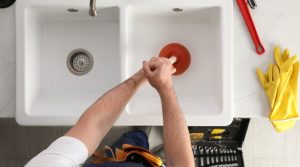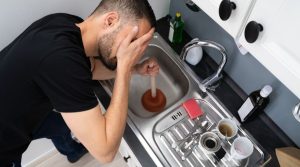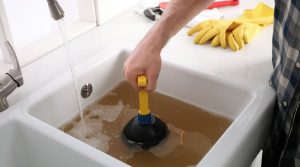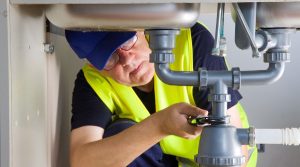Usually, a blockage in your home’s plumbing system is what’s behind the horrifying sight of unclean water backing up into your shower. Water may be routed to your shower if any of the drain lines from your shower, dishwasher, washing machine, or toilet are clogged. Before you clear that line, you must identify the primary offender.
A Main Sewer Line Clog: How to Unclog It
Some clogs have easy fixes you may perform on your own, requiring only some gloves and a plunger. As if they were created solely to annoy you, additional clogs keep resurfacing. A sewage line backup is often the result of recurring main drain clogs, which unfortunately could happen in every home.
Poor maintenance could lead to a clog in the main sewage line that runs through your house and is connected to all the plumbing systems. If your main drain gets clogged frequently, calling a plumber is the best line of action. The blocked drain at your home will then be repaired by a registered technician.
What are a few of the common causes of a blocked sewer line?
Several common factors, such as the following, can result in clogged sewage and main drains:
– Sewer pipes that are drooping, cracked, broken, or otherwise flawed – Tree roots that intrude on sewer pipes and prevent effective sewage drainage
– Bad toilet habits, include flushing paper towels, diapers, feminine products, and baby wipes and wipers.
Grease, fats, and oils may coagulate over time and cause obstructions and obstruction if they are poured down the drain.
Do Sewer Lines Become Clogged With Toilet Paper?
We emphasize the need to only flush human waste and toilet paper because flushing any other materials will damage your sewage system. The sewage system or a toilet, however, may become clogged with materials that are meant to be eliminated by those systems. Due to its slower rate of dissolution in water, too much toilet paper may clog the pipes.
While still comfortable to use, your toilet paper should disintegrate quickly. Your main drain could get jammed if the substance is too thick and takes too long to soften, especially if your sewer system is old or needs maintenance.
Causes and Effects of Drain Clog Ignorance
Minor obstructions can occasionally be cleared with basic home tools, but persistent blockage may be a sign that a bigger obstruction is developing in your drain system. Major obstructions typically result from the buildup of soap residue, lipids, hair, and other organic debris over the course of months or years. Specialized devices are required to remove these blockages.
If a homeowner disregards a large obstruction, little clogs will continue to develop with increasing frequency.
Severe blockages may also indicate a more serious issue: tree roots creeping into the drain pipe. If left alone, tree roots can completely ruin your pipes, causing a big blockage and a massive wastewater flow.
How Frequently Should Sewer Lines Be Cleaned?
Like other home equipment, sewer pipes need proper care and maintenance to function properly. Most homes don’t give their sewage system a second thought, let alone do routine maintenance unless there is a sewer line clog. To prevent serious obstacles, preventative measures are crucial.
That necessitates having your sewer lines inspected and cleaned by a qualified plumber every 18 to 22 months. The cost of this process is little, but it will save you money on replacements and repairs in the future.
If you notice any of the aforementioned signs and your main drain is still clogged, call a reputable plumber immediately away to examine and fix your sewage line. They will check all necessary components, including bathroom pipes, main drain pipes, and blocked kitchen drains.
If you aren’t up for tackling this type of repair yourself, our experts at True Plumbers and A/C are only a call away to handle all of your plumbing needs.
For all of your drain- and A/C-related problems, you can always count on the Passaic plumbers at CBJ Passaic Plumbers.
Our crew is available to assist whether the aforementioned techniques have not worked or you are scared to attempt the unclogging process yourself. Call 973-601-5593 right away to speak with one of our licensed plumbers. Homes in and around Passaic, New Jersey, can take advantage of our full range of plumbing services.





